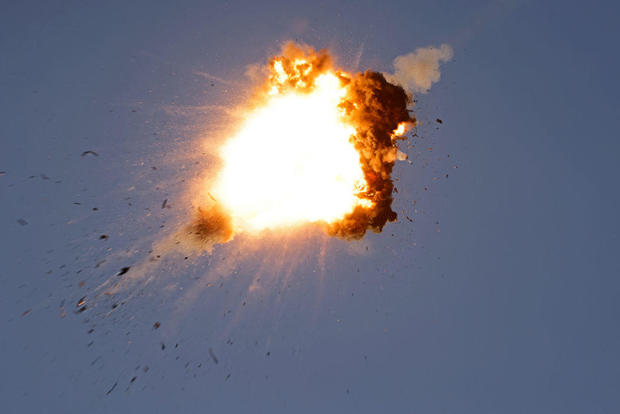Early Sunday, Israel carried out a series of intense airstrikes in southern Lebanon, describing the action as a preemptive move against the Hezbollah militant group. The escalation risks sparking a broader regional conflict that could derail ongoing efforts to establish a ceasefire in Gaza.
In response, Hezbollah announced it had launched a large-scale drone attack on Israel, following through on its promise to retaliate for the assassination of a senior commander last month.
“We have executed precise strikes in Lebanon to neutralize an imminent threat against Israeli citizens,” stated Israeli Defense Minister Yoav Gallant. “We are monitoring the situation in Beirut closely and will employ all necessary measures to protect our citizens.”
Israeli military spokesman Rear Adm. Daniel Hagari confirmed that “dozens of IAF jets are currently striking targets across southern Lebanon.”
Hezbollah reported that its operation involved launching more than 320 Katyusha rockets at multiple sites in Israel, alongside a significant number of drones. The group claimed the attack targeted “a qualitative Israeli military target” and other enemy positions, including Iron Dome missile defense systems. The assault was described as an initial response to the killing of Fuad Shukr, a top Hezbollah commander.
Amid the conflict, the Israel Airports Authority briefly suspended flights at Ben Gurion International Airport, diverting inbound flights to other locations. Flights resumed at 7 a.m. local time.
Defense Minister Gallant had previously ordered additional troops to the Lebanese border, anticipating potential conflict with Hezbollah. Hagari explained that the airstrikes were a defensive measure to eliminate threats from Hezbollah’s planned attacks on Israeli civilians.
Lebanese media reported strikes in the country’s south, while social media showed footage of explosions in the area.
Photos released by the office of Israeli Prime Minister Benjamin Netanyahu showed him and Gallant overseeing the military operation from the Kirya base in Tel Aviv. Netanyahu’s Security Cabinet was scheduled to convene later Sunday morning.
The U.S. National Security Council reported that President Biden, currently on vacation in Southern California, is closely monitoring the situation in Israel and Lebanon and has been in communication with his national security team.
Gallant’s office also announced a 48-hour emergency declaration allowing the Israel Defense Forces (IDF) to issue directives to the public, including restricting gatherings and closing certain sites. The IDF has imposed partial restrictions in areas such as Galilee and the Golan Heights.
Gallant briefed U.S. Defense Secretary Lloyd Austin on the strikes during a phone call, as confirmed by both the Pentagon and Gallant’s office.
These developments coincide with ongoing ceasefire negotiations in Cairo involving delegations from the U.S., Israel, Qatar, and Egypt. Although a Hamas delegation is also in Cairo, senior Hamas official Mahmoud Merdawy stated that the group would not participate directly in Sunday’s talks but would be briefed by Egypt and Qatar.
Concerns have been growing that the Israel-Hamas war in Gaza could escalate into a broader regional conflict, especially after Israel’s assassination of Fuad Shukr and a suspected Israeli operation in Iran that killed Hamas leader Ismail Haniyeh.
Earlier this month, White House national security spokesperson John Kirby indicated that the U.S. was preparing for a possible retaliatory attack by Iran and its proxies in response to these assassinations. In reaction, the USS Abraham Lincoln, an aircraft carrier with F-35 fighter jets, and the USS Georgia, a guided missile submarine, were recently deployed to the Middle East.


